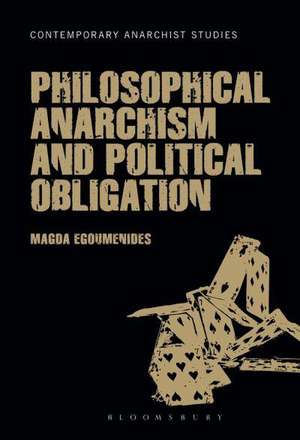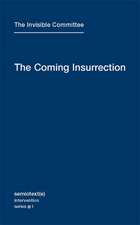Philosophical Anarchism and Political Obligation: Contemporary Anarchist Studies
Autor Dr. Magda Egoumenidesen Limba Engleză Hardback – 22 oct 2014
| Toate formatele și edițiile | Preț | Express |
|---|---|---|
| Paperback (1) | 239.14 lei 6-8 săpt. | |
| Bloomsbury Publishing – 22 oct 2014 | 239.14 lei 6-8 săpt. | |
| Hardback (1) | 833.47 lei 6-8 săpt. | |
| Bloomsbury Publishing – 22 oct 2014 | 833.47 lei 6-8 săpt. |
Din seria Contemporary Anarchist Studies
-
 Preț: 279.51 lei
Preț: 279.51 lei -
 Preț: 275.82 lei
Preț: 275.82 lei -
 Preț: 156.02 lei
Preț: 156.02 lei - 23%
 Preț: 236.37 lei
Preț: 236.37 lei - 26%
 Preț: 238.22 lei
Preț: 238.22 lei - 12%
 Preț: 239.59 lei
Preț: 239.59 lei - 23%
 Preț: 701.80 lei
Preț: 701.80 lei - 19%
 Preț: 705.10 lei
Preț: 705.10 lei -
 Preț: 280.18 lei
Preț: 280.18 lei - 13%
 Preț: 239.14 lei
Preț: 239.14 lei - 22%
 Preț: 257.41 lei
Preț: 257.41 lei - 23%
 Preț: 190.96 lei
Preț: 190.96 lei -
 Preț: 309.20 lei
Preț: 309.20 lei - 23%
 Preț: 721.29 lei
Preț: 721.29 lei - 23%
 Preț: 721.29 lei
Preț: 721.29 lei - 23%
 Preț: 722.14 lei
Preț: 722.14 lei -
 Preț: 362.95 lei
Preț: 362.95 lei
Preț: 833.47 lei
Preț vechi: 1067.44 lei
-22% Nou
Puncte Express: 1250
Preț estimativ în valută:
159.53€ • 173.35$ • 134.10£
159.53€ • 173.35$ • 134.10£
Carte tipărită la comandă
Livrare economică 21 aprilie-05 mai
Preluare comenzi: 021 569.72.76
Specificații
ISBN-13: 9781441193575
ISBN-10: 144119357X
Pagini: 296
Dimensiuni: 152 x 229 x 25 mm
Greutate: 0.59 kg
Ediția:New.
Editura: Bloomsbury Publishing
Colecția Bloomsbury Academic
Seria Contemporary Anarchist Studies
Locul publicării:New York, United States
ISBN-10: 144119357X
Pagini: 296
Dimensiuni: 152 x 229 x 25 mm
Greutate: 0.59 kg
Ediția:New.
Editura: Bloomsbury Publishing
Colecția Bloomsbury Academic
Seria Contemporary Anarchist Studies
Locul publicării:New York, United States
Caracteristici
Accessible volume that focuses on the key philosophical question of political authority
Notă biografică
Magda Egoumenides is Visiting Lecturer at the University of Cyprus. She has published articles in the Review Journal of Political Philosophy, Isopolitia, and the book Critical Philosophical Anarchism.
Cuprins
TABLE OF CONTENTSINTRODUCTION1. THE VARIETY OF ANARCHISMS. DEFINING CRITICAL PHILOSOPHICAL ANARCHISM WITHIN THE CURRENT DEBATE ON ANARCHISM2. THE MAIN PARTS AND UNDERLYING IDEAS OF MY ARGUMENTCHAPTER ONE: WHAT THE PROBLEM IS1.1. THE PROBLEM OF POLITICAL OBLIGATION1.1.i. The Correlativity Thesi1.1.ii. The Two Main Aspects of the Problem of Political Obligation1.1.iii. Quality-Based and Interaction-Based Evaluations of Political Institutions1.1.iv. The Conditions of Political Obligation1.2. THE PARADOX OF AUTHORITY1.3. DISSOLVING THE PARADOX: ROUSSEAU AS A PARADIGM OF STATE JUSTIFICATION1.4. RAZ'S THEORY AS AN ILLUSTRATION1.5. THE ARGUMENT FOR CRITICAL PHILOSOPHICAL ANARCHISM1.5.1. An Alternative to Prominent Positions on the State1.5.2. Improving the Way Critical Philosophical Anarchists See Their Position. Simmons' Theory as an Illustration1.5.2.i. Simmons' Theory1.5.2.ii. Specific Arguments against Simmons1.5.2.iii. A More General Departure from Simmons' Approach1.6. CONCLUSIONCHAPTER TWO.: THE LIMITS OF VOLUNTARISM2.1. AN ANARCHIST CRITICISM OF VOLUNTARIST THEORIES OF POLITICAL OBLIGATION2.1.1. Actual Consent2.1.2. Tacit Consent2.1.3. Hypothetical Consent2.1.4. Raz on Consent2.1.5. Social Contract Theories2.1.6. A Defense of Hypothetical Contractualism2.2. DISMISSING THE CONCEPTUAL ARGUMENT FOR POLITICAL OBLIGATION2.3. THE IMPLICATIONS OF THE ANARCHIST CRITICISM OF CONSENTCHAPTER THREE: AN ANARCHIST CRITIQUE OF THE RAWLSIAN IDEA OF A NATURAL DUTY OF JUSTICE3.1. RAWLS' THEORY AND THE NATURAL DUTY OF JUSTICE3.2. AN ANARCHIST CRITICISM OF THE NATURAL DUTY OF JUSTICE3.2.1. Against the Justice of Political Institutions as a Ground of Political Obligation3.2.2. The Argument Arising from Particularity3.2.3. Rawls and Particularity3.2.4. Self-Governance, Equality, and the Role of General Moral Principles3.3. THE IMPLICATIONS OF THE ANARCHIST CRITICISM OF NATURAL DUTYCHAPTER FOUR: THE FAILURE OF THE PRINCIPLE OF FAIRNESS AS AN ACCOUNT OF POLITICAL OBLIGATION4.1. THE PRINCIPLE OF FAIRNESS4.2. "TRIVIALITY," "SUCCESS," AND "JUSTICE"4.3. THE ANARCHIST CRITICISM OF THE PRINCIPLE OF FAIRNESS4.3.1. "Receipt" versus "Acceptance"4.3.1.i. Objections to Understanding Fairness Obligations in Terms of "Receipt"4.3.1.ii. Klosko's Defense of "Receipt"4.3.1.iii. Simmons on "Acceptance"4.3.1.iv. The Significance of "Acceptance"4.3.2. Fairness, Political Obligation, and the Idea of Societies as "Schemes of Social Cooperation"4.4. THE IMPLICATIONS OF THE ANARCHIST CRITICISM OF THE PRINCIPLE OF FAIRNESSCHAPTER FIVE: HORTON REVISITED5.1.HORTON'S PRELIMINARY ARGUMENTS FOR ASSOCIATIVE POLITICAL OBLIGATIONS5.1.1. About a Non-Voluntarist Contract Theory5.1.2. On the Communitarian Approach5.1.3. Against Associative Political Obligations5.2. HORTON'S CONSTRUCTIVE ACCOUNT OF ASSOCIATIVE POLITICAL OBLIGATIONS AND THE ANARCHIST CHALLENGE5.2.1. The Significance of Membership Argument5.2.2. The Hobbesian, or Value, Argument5.2.3. The Associative Argument5.2.4. The Anarchist Challenge5.3. THE CHALLENGE FROM MORAL UNIVERSALISM5.4. CONCLUDING REMARKS: THE VALUE OF HORTON'S ASSOCIATIVE THEORYCHAPTER SIX: WHERE FRIENDS OF POLITICAL INSTITUTIONS AND ANARCHISTS ARE IN THE SAME BOAT6.1. NEGATIVE AND POSITIVE POINTS RESULTING FROM THE ANARCHIST CRITICISMS6.1.1. The Negative Conclusions6.1.2. The Positive Conclusions6.1.3. The Implications of the Anarchist Challenge for Political Thought and Practice6.2. THE CONTRIBUTION OF CRITICAL PHILOSOPHICAL ANARCHISM6.2.1. The Anarchist Perspective6.2.2. The Significance of the Question of Obligation6.2.3. Justification as an Endless Process6.2.4. The Anarchist Ideal of Legitimacy6.3. CONCLUSIONCHAPTER SEVEN: ANARCHISM: PHILOSOPHICAL AND POLITICAL7.1. THE TASKS OF POLITICAL ANARCHISTS7.2. A CRITICAL PHILOSOPHICAL ANARCHIST CRITIQUE OF BOOKCHIN'S ANARCHIST POLITICAL PROGRAM7.2.1. Bookchin Revisited7.2.2. A Poststructuralist Intervention7.2.3. The Gordonian "Anarchy Alive!"7.3. ANARCHIST APPROACHES TO CONCRETE DILEMMASCONCLUSIONOVERVIEW OF THE RESULTS OF THE STUDYCONCLUSIONBIBLIOGRAPHY
Recenzii
In this thoughtful and passionately argued book Magda Egoumenides advances a distinctive approach to the problem of justifying political institutions that she calls 'critical philosophical anarchism'. After critically assessing a variety of justifications of state authority, Egoumenides distinguishes her own view from other forms of philosophical anarchism by locating it firmly within a more comprehensive anarchist theory. The result is a book that raises serious questions about the existing literature on political obligation, while also offering a controversial and challenging alternative; and in the process Egoumenides does much to revive the vitality of anarchist thinking.
Magda Egoumenides has done us the great service of keeping critical philosophical anarchism on the agenda of political philosophy. While not quite arguing for a anarchist position herself, Egoumenides demonstrates the importance of taking both the critical perspective and the positive insights of anarchism seriously. She reminds us that the existence of the state and the scope of its activities always face substantial moral challenge, and the battle for state legitimacy has to be fought and won on very difficult terrain. And she convincingly shows that anarchist theorists can also face challenges in living up to their own standards. This is a fresh and incisive contribution to the debate.
Philosophical Anarchism and Political Obligation speaks very cautiously and constructively to three constituencies: political philosophers who are troubled by the fundamental problem of political obligation; philosophical anarchists who are troubled by the grounds for and implications of their position; and political anarchists who are troubled by the fact that most people do not share their revolutionary point of view. As a member of all three constituencies, I find the book especially valuable.
Magda Egoumenides' Philosophical Anarchism and Political Obligation is a rigorous and knowledgeable account of the analytic philosophical reading of anarchism. Egoumenides perceptively extends the scope of philosophical anarchism's critique of 'political obligation' to contemporary anarchist and liberal theorists and arguments. It is a highly relevant text for all those engaged in this tradition.
Magda Egoumenides has done us the great service of keeping critical philosophical anarchism on the agenda of political philosophy. While not quite arguing for a anarchist position herself, Egoumenides demonstrates the importance of taking both the critical perspective and the positive insights of anarchism seriously. She reminds us that the existence of the state and the scope of its activities always face substantial moral challenge, and the battle for state legitimacy has to be fought and won on very difficult terrain. And she convincingly shows that anarchist theorists can also face challenges in living up to their own standards. This is a fresh and incisive contribution to the debate.
Philosophical Anarchism and Political Obligation speaks very cautiously and constructively to three constituencies: political philosophers who are troubled by the fundamental problem of political obligation; philosophical anarchists who are troubled by the grounds for and implications of their position; and political anarchists who are troubled by the fact that most people do not share their revolutionary point of view. As a member of all three constituencies, I find the book especially valuable.
Magda Egoumenides' Philosophical Anarchism and Political Obligation is a rigorous and knowledgeable account of the analytic philosophical reading of anarchism. Egoumenides perceptively extends the scope of philosophical anarchism's critique of 'political obligation' to contemporary anarchist and liberal theorists and arguments. It is a highly relevant text for all those engaged in this tradition.
















